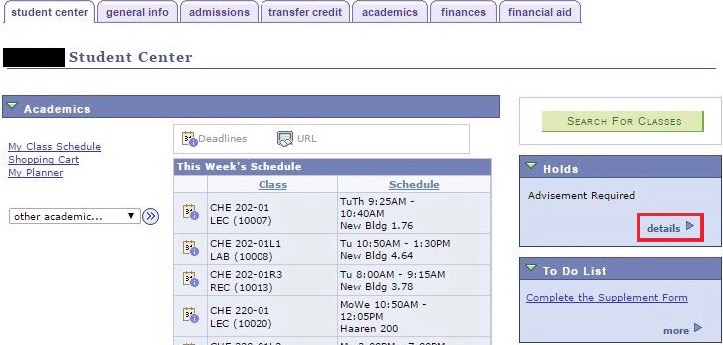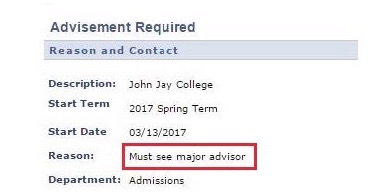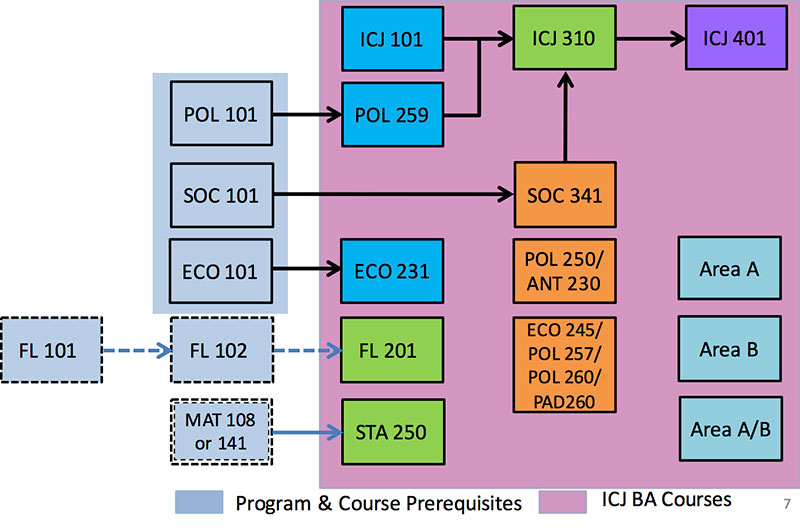International Criminal Justice Major Resources
Here you will find:
- Key information about your major
- How and when to meet with your major advisor
- Planning tools that will help you track your progress in the major
- Ways to explore career opportunities related to the International Criminal Justice major
Take a few moments to look at the information below. It will help you plan effectively and avoid surprises during your studies at John Jay. Please visit the International Criminal Justice Program's website for information, resources, and opportunities!
ICJ Requirements
You are responsible for the major requirements that were in effect when you declared the major. To confirm the requirements you should be following, go to the Undergraduate Bulletin for that academic year. For example, if you declared the ICJ major in Fall 2024 or Spring 2025, you would click on the 2024-2025 Undergraduate Bulletin. If you declared the major and then left the College for more than one full semester, you’re responsible for the major requirements in effect when you return, if they have changed.
Below, find the Undergraduate Bulletin that was in effect when you declared the major.
- 2024-2025 Undergraduate Bulletin - ICJ
- 2023-2024 Undergraduate Bulletin - ICJ
- 2022-2023 Undergraduate Bulletin - ICJ
- 2021-2022 Undergraduate Bulletin - ICJ
- 2020-2021 Undergraduate Bulletin - ICJ
- 2019-2020 Undergraduate Bulletin - ICJ
- 2018-2019 Undergraduate Bulletin - ICJ
- 2017-2018 Undergraduate Bulletin - ICJ
- 2016-2017 Undergraduate Bulletin - ICJ
- 2015-2016 Undergraduate Bulletin - ICJ
- 2014-2015 Undergraduate Bulletin - ICJ
- 2013-2014 Undergraduate Bulletin - ICJ
- 2012-2013 Undergraduate Bulletin - ICJ
Since the ICJ major is interdisciplinary, it allows you to take courses in a wide range of departments. A number of ICJ major course options also happen to meet general education requirements. We encourage you to be aware of this possible overlap, know that it’s ok for major courses to also meet general education requirements, but make an effort to look at interesting ways to meet requirements that don’t necessarily involve overlapping courses.
World Cultures: ANT 230, ARA 201, CHI 201, FRE 201, GER 201, ITA 201, JPN 201, POL 246, POR 201, SPA 201, SPA 211
U.S. Experience: POL 101 (ICJ prerequisite)
Individual & Society: SOC 101 (ICJ prerequisite)
300 level justice: AFR 320, HIS 352, HIS 359, POL 320, EJS 300
Major Advising
International Criminal Justice major advising is available year-round, including summer and winter terms.
Ms. Yaritma Cabral will be serving as ICJ advisor for the Fall 2025 semester. You can schedule an advisement appointment with her for the Fall Semester (beginning August 18th. Below is Ms. Cabral's schedule:
- Monday – Thursday 9-5pm (on campus Tuesday – Wednesday) & Fridays 9am until 1pm
- To make an appointment with Ms. Cabral, students can use her personal link: https://jjay-cuny.campus.eab.com/pal/5zaqKeouOa
- Or, Call her direct number at: 6460557-4879.
Ms. Yaritma Cabral's office hours will be in the advisement center. Her email is: ycabral@jjay.cuny.edu It is best to email her ahead of time to schedule an appointment.
If you prefer to meet with the ICJ Director, Professor Lior Gideon, his office hours will be on Tuesdays from 12:00-2:00. Please schedule your appointments with him ahead of time by emailing him at: lgideon@jjay.cuny.edu
International Criminal Justice majors who would like advising during Summer Session (June 2 - August 25) 2025 can email Ms. Yarmita Cabral at ycabral@jjay.cuny.edu.
Ms. Cabral is available on during the Summer on the below days:
- Summer: Monday - Thursday 8:30am – 5:30pm (and on campus Wednesday and Thursdays)
- Her office number (direct line) 646-557-4879
- To make an appointment with me students can use my personal link: https://jjay-cuny.campus.eab.com/pal/5zaqKeouOa
Sophomores with 45-59 credits may have a major hold placed on their registration. The hold will be removed when they have an appointment with either the ICJ advisor, Ms. Yarmita Cabral (ycabral@jjay.cuny.edu), or ICJ program director, Professor Lior Gideon (lgideon@jjay.cuny.edu). This discussion will encourage wise planning and allow students to ask any questions they may have about the major. How do you know if you have a major hold? Go to CUNYfirst and complete the following steps:
Check the Holds box of your CUNYfirst Student Center. If "Advisement Required" appears, click on “details.”

Click on “Advisement Required.”

See which type of advisement you need. If you must see a major advisor, then make a major advising appointment following the steps preferred by this department.

.
Plan Ahead: Graduate on Time
The ICJ major has several prerequisites and course sequences, so it is important to be aware of this and plan accordingly

- There are three prerequisite courses to the major: ECO 101, POL 101, SOC 101. Take these prerequisites early, since many major courses require them as a foundation.
- ICJ 101 is the first course in the major, and is also a prerequisite for several higher level major courses. Freshmen should focus on the major's prerequisites (ECO 101, SOC 101, POL 101) and delay ICJ 101 until the first semester of their sophomore year.
- ICJ requires STA 250, which has a MAT 108 or MAT 141 prerequisite. Complete the necessary math foundation early, preferably in your freshman year, and then take STA 250 right away.
- ICJ has a 200 level language requirement, and many students will need to take the 100 level language foundation courses (101-102 or 111-112). Take your language courses early, in consecutive semesters, and remember that they can count towards general education requirements as well. See the Language Requirement section below for important planning information.
- Plan carefully for the required course sequences shown in the chart above. For example, POL 101 → POL 259 → ICJ 310 → ICJ 401.
- 300-level courses will often require that you have junior standing (at least 60 credits earned).
- For detailed information about prerequisites for your Part Four Specialized Areas course options, click here!
- If you are interested in pursuing the optional internship (ICJ 381) in the major, speak with Professor Michel about this early so you can work it into your academic plan. Both POL 259 and SOC 341 are required prerequisites for this course, along with permission from the ICJ coordinator. See the Internships section of the ICJ major resource page for more information.
- Remember that you will need at least a 2.0 GPA in the major and at least a 2.0 overall GPA to graduate.
ICJ majors must complete a 200-level course in a foreign language (usually the course number is 201), and these courses have 100-level prerequisites. Keep the following important information in mind:
- The foreign language 201 courses are typically offered only in the fall semesters.
- SPA 207, SPA 308 and SPA 335 (and any other courses taught in English) do NOT fulfill the ICJ language requirement.
- The ICJ language requirement can be waived for students who show the ICJ program director their high school diploma from a non-English speaking country. As an alternative, the ICJ language requirement can be waived if students choose to take a Foreign Language Proficiency exam (such as CLEP or the NYU Foreign Language Proficiency Exam) and submit a passing score to the Office of Academic Credit Evaluation. For more information, please speak with the ICJ major advisor.
- If you have prior knowledge of a foreign language, you can take a placement exam in the Modern Language Center to place out of prerequisites and possibly the 200 level requirement. You can drop by 7.64 New Building on M-F to take a placement test; no advance appointment is necessary. Note that placement tests at John Jay are only available in Arabic, Chinese, French, German, Italian, Japanese, Portuguese and Spanish. If you have background in a language that is not on this list, ask the Modern Language Center about the NYU proficiency exam, which will determine your language proficiency and may allow you to earn credits towards your John Jay degree (be sure to find out what this NYU option would cost).
The John Jay College Office of International Studies and Programs and many other CUNY Study Abroad Offices offer our students a wide range of short-term, semester, and year-long programs that lead to significant cultural and academic experiences.
The ICJ BA program honors study abroad course credits. To use study abroad credits towards the ICJ major, students must get approval from the ICJ BA program director Professor Verónica Michel (vmichel@jjay.cuny.edu) before registering for the study abroad course. No approval will be given retroactively for study abroad courses that you’ve already taken.
- DegreeWorks degree audit - Use this online planning tool to track your overall progress toward graduation. You will see which of your general education and major requirements are completed, in progress, or still needed. Refer to the DegreeWorks FAQs to better understand how to use this helpful tool. Note: be sure to confirm the accuracy of your degree audit with a general advisor and major advisor.
- ICJ Major Checklist - Fill out this printable worksheet to keep track of which major requirements you have completed and which ones you still need. For detailed information about prerequisites for your Part Four Specialized Areas course options, click here!
- Sample Four Year Plan - See an example of how you could complete all your degree requirements (major, general education, electives) and graduate in four years! Remember that this sample plan shows just one possible way to combine your requirements. Transfer students in particular should work with advisors to determine a plan that works best for them.
A General Academic Advisor will confirm what general academic requirements you still need, make suggestions about smart course planning that will help you graduate without delays, discuss your interest in adding a minor or second major, inform you about opportunities such as study abroad, discuss general questions and concerns, and make helpful referrals. Visit the Academic Advisement Center's webpage for more information.
ICJ and Careers
ICJ majors are not required to pursue an internship, but we strongly recommend it. Internships provide valuable perspective as well as practical work experience, helping you shape career goals and showing potential employers a willingness to take initiative.
If you are interested in finding out about ICJ internships, the first step is to talk with Professor Verónica Michel (vmichel@jjay.cuny.edu). She can answer your preliminary questions and give you general information about ICJ 381, the 3-credit course connected with any ICJ internship. This course runs in both the fall and spring terms. Please note that POL 259 and SOC 341 are prerequisites for this course.
The second step is to find an internship. Be aware that you will need to find an internship before registering for the course. For help in your internship search, you can consult with Professor Verónica Michel (vmichel@jjay.cuny.edu). She can offer helpful guidance and provide a list of agencies where students have been placed for an ICJ internship. The Career Learning Lab is also available to answer your questions about any procedures necessary to set up your internship and register for ICJ 381.
ICJ provides a strong foundation for graduate work in many fields, including Criminal Justice, Criminology, Public Management/Administration, International Criminal Justice, Comparative Criminology/Criminal Justice, International Affairs, International Business Management, International Human Rights, International Law, International Relations, International Politics, and Gender Studies.
If you are interested in pursuing graduate work, please consult with the ICJ program director, Professor Verónica Michel (vmichel@jjay.cuny.edu), for guidance.
ICJ Dual Admission Accelerated Program (DAAP)
Admission to the ICJ DAAP is paused until further notice. For questions or concerns please contact the Director of the ICJ BA, Dr. Veronica Michel (vmichel@jjay.cuny.edu).
We encourage students to participate in the job fairs that are held at the college every semester. See the Career Learning Lab for job fair information.
The CUNY Edge Program helps students navigate successfully through college and obtain employment.
The CUNY Counseling Assistantship Program (CUNYCAP) affords recent CUNY graduates the opportunity to gain valuable work experience in various student service-oriented positions throughout CUNY.
The ICJ major prepares students for jobs in Federal, State, or Local Government; Security & Investigations; Law Enforcement; and International Agencies. Research the agencies below as you consider your professional path. Please note that jobs in these organizations are competitive. They emphasize required skills and competencies including GPA, employment/internship experience, language proficiency, computer and personal skills. Our ICJ graduates have obtained jobs in these agencies over the years. A Master’s degree with our ICJ is highly recommended for anyone seeking jobs in these agencies/organizations:
Amnesty International/International Secretariat
Human Rights Watch and other human rights organizations
Women’s organizations dealing with human trafficking
United Nations (translation/interpretation, security, research assistance, drug control program)
International Monetary Fund (IMF)
International Labor Organization (ILO)
World Customs Organization (WCO)
World Health Organization (WHO)
The lists below show a range of careers that ICJ majors can pursue. Research the ones that interest you to learn about the field and any particular qualifications required:
Federal, State, or Local Government
U.S State Department-Administrative Officer
Diplomat
Foreign Service Officer
Management Analyst or Trainee
Project Director
Homeland Security - entry level employee
Coast Guard employee
Fire and emergency services
Research Assistant/Analyst
Security & Investigations
International Criminal Investigator
Security Specialist
Private Security Guard
International Banking Security Clerk
Law Enforcement
Air Marshal
Central Intelligence Agency (CIA) Agent
Counter Narcotics Policy Oversight Officer
Drug Enforcement Agency (DEA) Agent
Federal Bureau of Investigation (FBI)
Intelligence Officer
Police Officer
Secret Service Agent
Special Agent
State Trooper
U.S. Marshal
Border Patrol agent
Federal Courts and Corrections
Court Clerk
Court Officer
Court Security Specialist
Psychology & Social Services
Advocacy Associate
Case Planner
Criminologist
Domestic Violence Against Immigrant Women Counselor
Family Support Worker
Juvenile Counselor
Mediation Counselor
Victim Assistance Counselor
Youth Services Coordinator.